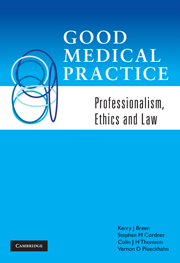Book contents
- Frontmatter
- Foreword
- Contents
- List of tables
- Preface
- Preface to the 1997 edition
- Acknowledgments
- About the authors
- Table of cases
- Table of statutes
- 1 Ethical principles for the medical profession
- 2 Ethical and legal responsibilities of medical students
- 3 Communication skills
- 4 Consent and informed decision making
- 5 Confidentiality, privacy and disclosure
- 6 Medical records, reports and certificates
- 7 Negligence, professional liability and adverse events
- 8 The regulation of the medical profession
- 9 Health care complaints systems
- 10 The doctor and sexual boundaries
- 11 Personal health of the doctor: illness and impairment
- 12 Maintenance of professional competence
- 13 Ethics and the allocation of health-care resources
- 14 The Australian health-care system
- 15 The doctor and interprofessional relationships
- 16 Entering and leaving practice and practice management
- 17 Clinical research
- 18 Prescribing and administering drugs
- 19 Diagnosing and certifying death and the role of the coroner
- 20 Births, reproductive technology, family law and child protection
- 21 Termination of pregnancy and related issues
- 22 Withholding or withdrawing treatment in the seriously or terminally ill
- 23 The law and the mentally ill
- 24 The law and courts of law in Australia
- 25 Medico-legal examinations and reports, court procedures and expert evidence
- 26 Other legislation relevant to medical practice
- APPENDIX 1 AMA CODE OF ETHICS – 2004
- Index
- References
17 - Clinical research
- Frontmatter
- Foreword
- Contents
- List of tables
- Preface
- Preface to the 1997 edition
- Acknowledgments
- About the authors
- Table of cases
- Table of statutes
- 1 Ethical principles for the medical profession
- 2 Ethical and legal responsibilities of medical students
- 3 Communication skills
- 4 Consent and informed decision making
- 5 Confidentiality, privacy and disclosure
- 6 Medical records, reports and certificates
- 7 Negligence, professional liability and adverse events
- 8 The regulation of the medical profession
- 9 Health care complaints systems
- 10 The doctor and sexual boundaries
- 11 Personal health of the doctor: illness and impairment
- 12 Maintenance of professional competence
- 13 Ethics and the allocation of health-care resources
- 14 The Australian health-care system
- 15 The doctor and interprofessional relationships
- 16 Entering and leaving practice and practice management
- 17 Clinical research
- 18 Prescribing and administering drugs
- 19 Diagnosing and certifying death and the role of the coroner
- 20 Births, reproductive technology, family law and child protection
- 21 Termination of pregnancy and related issues
- 22 Withholding or withdrawing treatment in the seriously or terminally ill
- 23 The law and the mentally ill
- 24 The law and courts of law in Australia
- 25 Medico-legal examinations and reports, court procedures and expert evidence
- 26 Other legislation relevant to medical practice
- APPENDIX 1 AMA CODE OF ETHICS – 2004
- Index
- References
Summary
Research aimed at understanding and preventing disease or at improving the diagnosis or treatment of disease is generally welcomed by society, especially where it is conducted primarily with altruistic motives. Such research may carry risks for the human subjects involved. Experience has shown that even well-motivated researchers may pursue their research inappropriately, to the detriment of the research subjects. To protect research participants, international and national codes of research ethics have been in place for nearly 50 years. In Australia, health and medical research is now overseen by nationally regulated research governance systems in place in hospitals and medical research institutes [1–2], a key element of which is prospective ethical review of research proposals by human research ethics committees (HRECs). This chapter summarises the ethical principles of human research, the governance of research, the expected standards of good research practice, the responsibilities of clinical researchers and the topic of research misconduct by doctors. Overlapping with research are clinical audit and quality assurance studies in which doctors are increasingly expected to participate and which can raise similar ethical issues.
CODES OF ETHICS IN CLINICAL RESEARCH
The stimulus for the development of an international code of medical ethics, specifically in regard to research, was the gross abrogation of accepted ethical standards involved in so-called medical research by some doctors in Nazi Germany before and during the Second World War.
- Type
- Chapter
- Information
- Good Medical PracticeProfessionalism, Ethics and Law, pp. 266 - 278Publisher: Cambridge University PressPrint publication year: 2010



